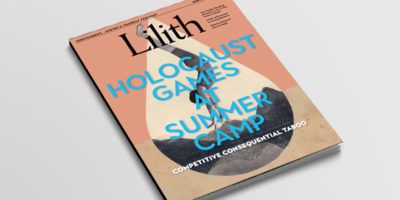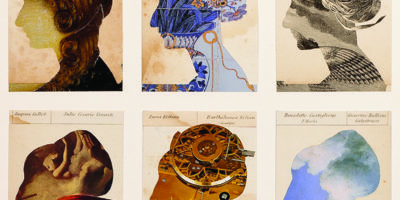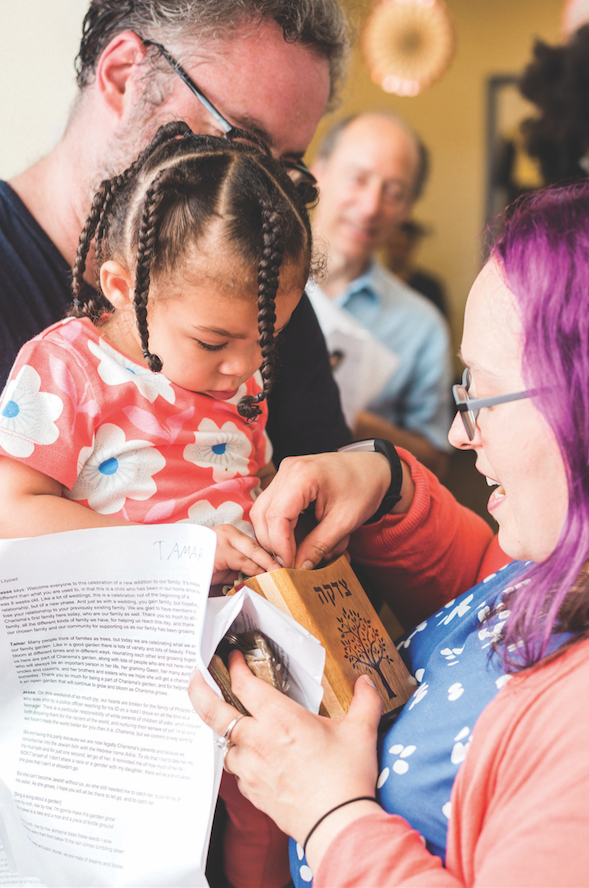
My Adopted Daughter Becomes a Jew
A very inclusive conversion ritual
 For years, when people asked me how many children I had, I wasn’t sure how to answer. It could be anything from 0–3. I have one stepdaughter who lives with us half the time. I have one foster daughter who lived with us for nine months before she was reunited with her mom, but they still remained close, spending lots of time with us. And I had one foster daughter who came to us when she was two months old.
For years, when people asked me how many children I had, I wasn’t sure how to answer. It could be anything from 0–3. I have one stepdaughter who lives with us half the time. I have one foster daughter who lived with us for nine months before she was reunited with her mom, but they still remained close, spending lots of time with us. And I had one foster daughter who came to us when she was two months old.
Just shy of two years after she arrived in our home, my foster daughter Charisma became my daughter Charisma. In the morning, we stood before a judge and were legally declared a family. In the afternoon, my partner, Jesse, helped her into a mikveh, and when she emerged she was a Jew, soaking wet and astonished. What is going on? her eyes said as we lifted her out of the water, wrapped her in a towel, and sang siman tov u mazel tov, teary and sweaty in the humid mikveh room.
There had been a whole year from when we knew we would adopt Charisma until it really happened. We filled out forms and had background checks and got fingerprinted twice. Caseworkers filed reports, and meanwhile Charisma grew from an infant to a chubby baby, and then a toddler speaking full sentences, running full out, learning to use a scooter.
In the year before the adoption was final, I often daydreamed about having a party for her to mark the transition—adoption and conversion all in one. It was a complicated daydream, because I wanted to celebrate Charisma, with all of her eponymous charisma, charm, wisdom and glee, but celebrating her adoption felt not quite right. Much as I looked forward to putting the bureaucracy of foster care behind me, I did not want to celebrate that Charisma had needed our house to begin with, that she’d had to be separated from a mother who loved her very much—and loves her still. Through conversations with friends who were adopted, and with other foster parents, I learned that many adoptees feel it’s disrespectful to celebrate a day when they experienced a great loss, being finally legally separated from their biological parents. I thought of Charisma growing up, and asking me about her adoption. I didn’t want her ever to think we would celebrate that she was taken from her mother, whatever the circumstances.
But I often attend baby-namings and brisses for family and friends, and I so love the opportunity to rejoice with a family, to wonder in the beauty of a new person, to hear parents speak tearfully about namesakes, hopes and dreams for their child. I wanted Charisma to have that, to be surrounded by friends and family celebrating her existence in the world. I wanted her to know that while my partner and I grieved with her for the loss that came from being separated from her mother, we also delighted in her each day, loving her wholly and intensely.
As the date of the adoption approached, we discussed how to mark the occasion without erasing any part of Charisma’s story or identity. We decided to see if we could get a date for her conversion to Judaism right away. Then the party could focus on her conversion, and not her adoption. By a stroke of luck, we were able to book the mikveh for the afternoon following the adoption, and set about planning rituals for the conversion itself, and for a public celebration.
When babies and young children are converted to Judaism they are traditionally dunked in a mikveh without saying the blessing the adult converts say. We are regulars at our local Conservative synagogue, and worked with our friend and rabbi Yosef Goldman to create something that would be meaningful and appropriate.
For both rituals we drew on resources that we found at ritualwell.org, and from friends and family who have created and recreated all kinds of ceremonies and blessings to mark milestones.
At the conversion we formally gave Charisma the Hebrew name Adira Paz, and we adapted a ritual that our friends Beverly and Naomi Socher-Lerner created for their daughter, using water from the mikveh to symbolically remove the orla (roughly translated as a spiritual blocker) from Adira’s lips, ears, and heart.
Conversion
We began by reading “Prayer at the Adoption of a Child,” by Rabbi Rami Shapiro, from ritualwell:
We are humbled by
the awesome responsibility of this moment.
We are filled with joy and trembling as we
contemplate the tasks that lie before us:
the task of rearing our child in love,
the task of teaching courage,
instilling honesty, integrity, responsibility.
May we come to embody the virtues
we teach, and may our child see in us
the values and behaviors we hope to see in her.
May she never regret this moment
of choosing and home coming,
when we took her into our hearts
and became one family.
May this day be a special memory for us,
recalling new possibilities for love.
May our child be a blessing to all she meets.
And may she count us among her blessings
as well.
[say the Shehechiyanu]
Jesse then took Adira down into the mikveh, dunked her under water, and let go. For one split second I saw her suspended in water, her beautiful curly hair haloing around, eyes wide in shock. Jesse grabbed her back and lifted her out of the water. (In the few months before the conversion we practiced dunking Adira in our local swimming pool, so while she was definitely a little scared, it didn’t come completely out of nowhere for her.) We wrapped her in a towel, and Rabbi Tamara Cohen then read this blessing, taken from a longer prayer found at ritualwell:
May God who blessed Sarah and Rebecca, Rachel and Leah, Miriam the Prophetess, and Queen Esther, daughter of Avichayil, Bless this sweet child with good fortune and timely blessings. And may her name be called among the Daughters of Israel Adira Paz, Daughter of Tamar Elisheva and Avram Zeleg. May she be raised in good health, peace and tranquility. Grant that her parents watch her grow happily and look forward to escorting her to the marriage canopy. May this be God’s will. And let us say, Amen.
We then read the following blessing, and used a washcloth to sponge water from the mikvah onto Adira’s lips, ears, and heart.
We touched water to:
Her Lips
Exodus 6:30
And Moses said before the LORD: ‘Behold, I am of uncircumcised lips, and how shall Pharaoh hearken unto me?’
We remove the orla from your lips that you may speak for justice.
Her Ears
Jeremiah 6:10
To whom shall I speak and give warning, that they may hear? Behold, their ear is dull, and they cannot attend; behold, the word of the LORD is become unto them a reproach, they have no delight in it.
We remove the orla from your ears that you may hear and recognize wise counsel.
Her Heart
Deuteronomy 10:16
Circumcise therefore the foreskin of your heart, and be no more stiffnecked.
We remove the orla from your heart, that you may experience love, which is an experience of God.
The Communal Celebration
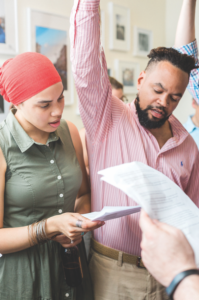 Two days later we gathered with dozens of friends and family to celebrate Adira’s conversion. There was a cake featuring a fox and a lush garden of flowers, decorations, toys, bagels, of course, and another ritual.
Two days later we gathered with dozens of friends and family to celebrate Adira’s conversion. There was a cake featuring a fox and a lush garden of flowers, decorations, toys, bagels, of course, and another ritual.
Jesse began by talking about how this celebration was a lot like a wedding. Not a celebration of the beginning of a relationship, but of a new phase. And just as with a wedding, we were celebrating that Adira had gained family, without losing her relationship to her first existing family. We were very lucky to have some members of Charisma’s family to join us for the celebration, and we thanked them, as well as our own families for being so supportive and welcoming of Charisma.
Many people think of families as trees, but our theme for the party was our family garden. Like in a good garden there is lots of variety and lots of beauty. Flowers bloom at different times and in different ways, nourishing each other and growing together. All of us there were part of Charisma’s garden, along with lots of people who were not there—her mom, grandma, her many aunts and uncles and cousins, and her brothers and sisters whom we hope she will get a chance to meet someday.
The celebration came just a few days after yet another police officer was acquitted for killing a person of color. Charisma is black, and we felt it was important to acknowledge in our celebration that the country she is growing up in is struggling with racial justice. We pledged to be part of the struggle, and to work with people of color to help build a better country for Charisma, and for all of us.
We spoke briefly about her name—in English, Charisma Esther, and in Hebrew, Adira Paz. And we spoke about the women that she is named after: Jesse’s grandmother, Esther, my mother, Beverly, and my aunt, Peggy.
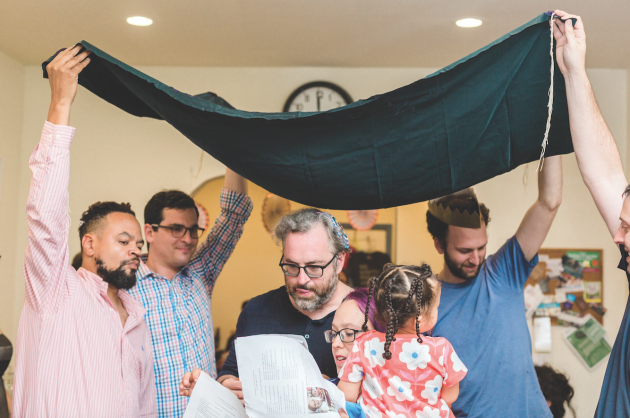 When a Jewish baby is born it is traditional to wish that they will go on to Torah, chuppah, v’maasim tovim, learning Torah, going to the marriage canopy, and doing good deeds. For the final part of our ritual we asked friends to spread a chuppah, a canopy over us. The canopy was my tallit, which I made with my mother for my bat mitzvah. As we stood with Charisma under the chuppah, we received and gave blessings from the Torah, and Charisma finished by giving tzedakah, charity—a good deed to start off her Jewish life.
When a Jewish baby is born it is traditional to wish that they will go on to Torah, chuppah, v’maasim tovim, learning Torah, going to the marriage canopy, and doing good deeds. For the final part of our ritual we asked friends to spread a chuppah, a canopy over us. The canopy was my tallit, which I made with my mother for my bat mitzvah. As we stood with Charisma under the chuppah, we received and gave blessings from the Torah, and Charisma finished by giving tzedakah, charity—a good deed to start off her Jewish life.
Beforehand, I had worried that it might be challenging to try to do a public ritual with a toddler, as opposed to with a newborn, who can’t really do a lot of protesting. Luckily, Charisma was happy to have all of her friends around her, and was pretty tolerant about being the topic of discussion, wandering off only once. She was very excited to give tzedakah, which she does every Friday before Shabbat, and to be pelted with candy (who wouldn’t?).
We began by giving Charisma this blessing we found on ritualwell:
Our God and God of our ancestors may the life of this child be one of happiness, goodness, and wisdom. Grant that she may seek peace and pursue an end to strife in the world. May she spread light on all who know her. May she study the Torah and find delight in it. May she follow the steps of other great leaders of Israel, whose deeds continue to shine across the span of time.
Then we stood under the chuppah, and had friends and family read the following blessings:
May God make you like Sarah, the wife of Abraham’s youth, and a loyal partner. May it be that belief and steadfastness, giving and kindheartedness, be the foundations of your life.
May God make you like Rebecca, wife of kindness and the pillar of giving. May your hands and heart be open at all times to all people, and charity and kindness, the light of your ways.
May God make you like Rachel, a gift of the heart, beloved, and a loving mother. May it be that you will be full of love to all souls and creations, you will love others, and be loved by them.
May God make you like Leah, the mother of children. May it be that you will build a house of trust, its foundations of faith, and its interior full of love.
May God Make you like Miriam, the prophetess and leader of her people. May it be that you will succeed to have your voice heard in general matters as in questions of details, and to express your treasured characteristics in the ways of study and in the world.
May God make you like Abigail, intelligent and wise, who prevented David from sinning. May it be that you lead your life with good counsel and wisdom, and that you love truth and peace.
May God make you like Esther the daughter of Avichayil, Queen of many nations and the savior of Israel. Who cast in her lot with the fate of her people and her God, who risked her life and did not remain silent. Who with her wit, intelligence and bravery brought about salvation for the Jews and failure for those seeking to annihilate them. May your thoughts always be among your peers, feeling their pain and enjoying their joy, and may your soul always be bound with the destiny and hope of your people.
Our parents then came forward and gave us the traditional blessing of the children. My father gave the blessing in Hebrew to me, using the traditional feminine text.
Then Jesse’s parents gave him the traditional blessing for boys, in English:
May God make you to be like Ephraim and Menashe.
May God bless you and watch over you.
May God shine upon you and be gracious to you.
May God look towards you, and grant you peace.
Then we gave the blessing in Hebrew and English to our daughter, changing the text so that it asked God to make her like her namesakes: Esther, Beverly and Peggy, or in Hebrew, Esther, Devora and Penina:
May God make you to be like Esther, Beverly and Peggy.
May God bless you and watch over you.
May God shine upon you and be gracious to you.
May God look towards you, and grant you peace.
Charisma carefully pushed a dollar into her new tzedakah box, and then the crowd of friends and family showered us with candy, and sang siman tov u-mazel tov.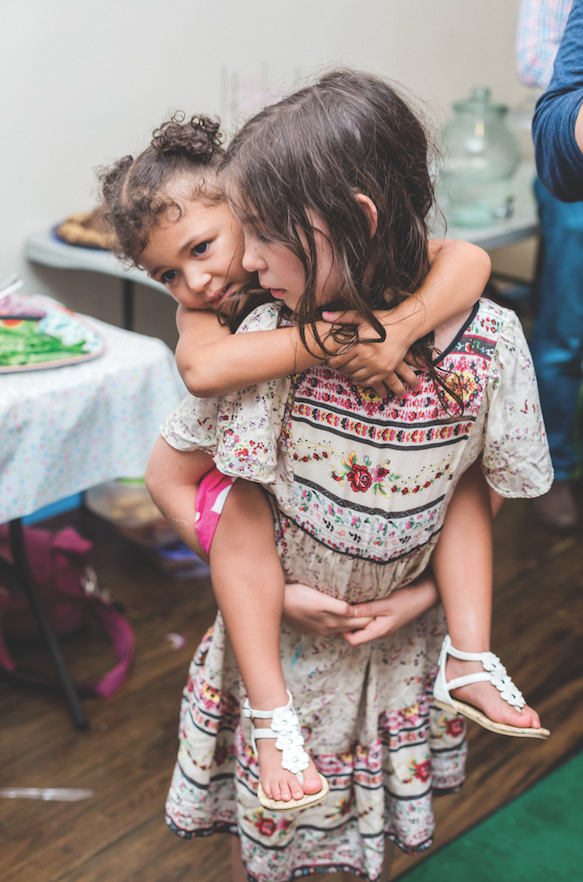
Tamar Fox is a writer and editor in Philadelphia. She writes about grief, parenting, feminism, and fostering all over the internet, and in print.

